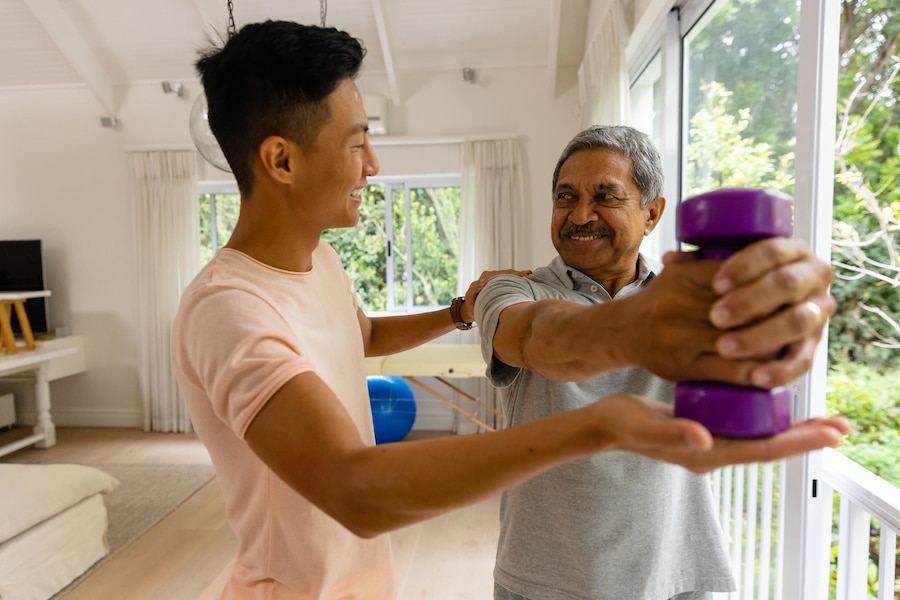It is not uncommon to find elder parents staying on their own while children are away in a different city or country. Most often children find it difficult to manage the well- being and health of the elder parent remotely and depend on friends and relatives in town to take care of them in case of emergencies.
Use these 7 steps to turn the vague problem of “my aging parents need help” into a practical, realistic plan to help mom or dad be as healthy and happy as possible.
1. Assess your parent’s needs
Finding out what is required to keep your parents healthy and safe is key to finding the right blend of care your parents need.
To solve that problem, take a step back to understand how much help your parent needs with everyday life.
Think about 8 key areas:
- Family support
- Home safety
- Medical needs
- Cognitive health
- Mobility
- Personal hygiene
- Meal preparation
- Social interaction
How much support are they already getting in each category and how much help do they realistically need to stay safe and healthy?
Write everything down in a caregiving notebook so you can keep track of their needs and figure out what services are needed.
For example, let’s say your father is a diabetic staying alone with no own transport and who needs to be on a diabetic diet and regular blood sugar.
To provide the support he needs, you might sign for a home health program like the one by Dr. Rahul’s Elder Care, set up grocery or meal deliveries, and hire an in-home caregiver to prepare meals and make sure he’s taking his medicine.
2. Think about your own needs and abilities
Everyone is in a different place in their lives. Taking care of elder parent is not easy.
Before you make the assumption that you can take care of all your parent’s needs by yourself, stop and think about your own situation and abilities.
- Does your health allow you to physically care for someone?
- Do you live close enough to visit as often as needed?
- Would you want to live with them, either in their house or yours?
- Do you have the kind of relationship that allows you to spend a lot of time together without creating a lot of negative feelings on either side?
- Do you have the personality to provide the type of care they need?
- Are you willing to learn how to provide that care?
We want our parents to be safe and healthy. And it’s not selfish or heartless if you’re not the best person to personally provide that care.
By looking out for their health and safety and arranging the help they’ll need, you’re still being a supportive and caring child.
It’s best to make an honest assessment early in the process so you don’t get yourself into a situation that’s not sustainable.
If you take on too much and burn out physically or emotionally, you won’t be able to help your parent or yourself.
3. Include your parent in the process
Elder parents treasure their independence and don’t want to be treated as sick.
That’s why it’s so important to involve your parent as much as possible when you’re planning for their care.
This helps them see you more as a partner rather than someone who’s swooping in to make changes.
They’re likely to be resistant in the beginning, so it will probably take multiple conversations.
As long as they’re not in immediate danger, try not to force changes too quickly. You might want to start with less intrusive approaches and increase the level of help as you go.
Unless it’s an emergency situation, get them used to accepting help by focusing on 1 or 2 critical needs.
After that, slowly add on until they’re getting all the help they truly need.
4. Understand the financial situation
No matter what, caring for an older adult will cost money. It’s a good strategy to estimate future costs so you’ll be prepared.
Think about the medical care they’re likely to need, the cost of their potential living situation (like assisted living vs moving in with you), and everyday costs like food, caregiving supplies, home safety modifications, etc.
Once you have an idea of their financial position, you’ll know if they’ll be able to afford the care they need or if they’ll need financial help.
5. Take care of home safety basics
Safety hazards in the house add up over time, making it easier for older adults to trip, fall, or hurt themselves.
Preventing falls will go a long way to keeping your parent independent for as long as possible.
Simple fixes include:
- Making sure all floors and walkways are clear of clutter, cords, and rugs
- Adding grab bars in the bathroom and stair railings throughout
- Updating lights so all rooms are bright and switches are easily accessible
- Ensuring all appliances work well and are within easy reach
- Minimizing the need to use step-stools or bend down low
6. Make sure communication is simple and accessible
Another thing that keeps your parent safe is the ability to easily call for help and keep in touch with family and friends.
On top of being a safety hazard, isolation and loneliness have a serious negative effect on overall health.
Make sure their phone is easy to use and easily accessible. For some, keeping a simple mobile phone with pre-programmed numbers in their pocket is reassuring and easier to get to.
Or, if your parent is open to the idea, consider a wearable medical alert device.
7. Explore available aging care options
Even after breaking down the steps, caring for your parent can be an overwhelming responsibility.
Fortunately, there are many aging care options and helpful resources you can rely on.
- Geriatric care managers – they can act as consultants to guide you or they can manage all aspects of caring for your parent. Their experience could save you time, money, and headaches down the road. Dr Rahul’s Elder care provides dedicated care managers through premium membership programs. https://membership.drrahulseldercare.com/
- In-home caregiving help – whether you hire privately or go through a home care agency, hired caregivers to take care of seniors in their home
- Assisted living communities – if your parent isn’t able to live on their own or needs 24/7 care, assisted living might be the right choice. Silvernest Senior Living apartments provide the right choice for parents who need assisted living.
- Geriatricians (geriatric doctors) – specialize in caring for seniors and have more experience treating people with multiple chronic health conditions and other conditions that primarily affect older adults
Dr Rahul’s Elder Care provides comprehensive elder care through unique home and community-based health programs. SIlver nest senior living is their assisted living homes and Kalyani memory Care center provides 24X7 residential care for elders with dementia.
“We are excited to announce that we have expanded our geriatric care clinic to Kochi, also known as Cochin, in Kerala. Our experienced team of doctors and nurses is dedicated to providing high-quality medical care and compassionate support to seniors and their families. We offer a range of services, Doctor consultation at home, and nursing. Whether you need medical attention for yourself or your loved ones, we are here to help. Contact us today to schedule an appointment and experience the difference at Dr. Rahul’s Elder Care.”



